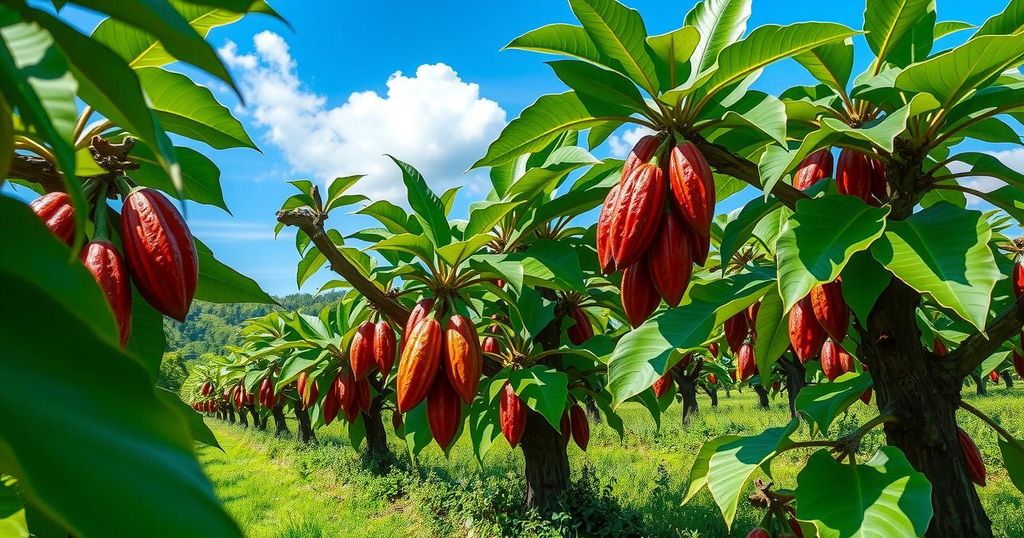Nigeria is striving to enhance its cocoa production in response to soaring global prices, aiming to challenge top producers like Ivory Coast and Ghana. With a target of 500,000 tonnes for 2024-2025, the government emphasizes investments and support for small-scale farmers amidst environmental concerns. Experts stress the need for sustainable practices to bolster the agricultural sector’s growth.
Nigeria is aiming to enhance its position in the cocoa market, capitalizing on soaring prices that have reached a record $12,000 per tonne in December. This strategy seeks to diversify an economy heavily reliant on oil and to potentially rival top producers like Ivory Coast and Ghana, whose cocoa crops have suffered due to climate change and diseases.
In response to favorable market conditions, numerous local firms have shown interest in investing in cocoa production. Patrick Adebola, executive director at the Cocoa Research Institute of Nigeria, remarked on the positive conditions stating, “The farmers have never had it so good.” Additionally, the British government’s development finance arm has recently invested $40.5 million into Nigerian agribusiness, Johnvents, highlighting increased interest in Nigeria’s agricultural sector.
Nigeria is currently the seventh largest cocoa producer globally, with an output of over 280,000 tonnes in 2023, according to the UN’s Food and Agriculture Organization. The government has set an ambitious production goal of 500,000 tonnes for the 2024-2025 season, aiming to become the fourth major producer behind Ivory Coast, Ghana, and Indonesia.
While Adebola is skeptical about achieving this target in the immediate future, he believes that within a few years, the goal is attainable due to rising interest in rehabilitating old plantations and establishing new ones. Notably, Nigerian farmers face more volatile market conditions compared to their peers in regulated countries, impacting their economic stability.
Despite the recent downturn in cocoa futures in New York, prices remain significantly high at over $8,000 per tonne, still above typical ranges of $2,000 to $3,000. Comrade Adeola Adegoke, president of the Cocoa Farmers Association of Nigeria, noted, “Individuals are going into cocoa production at every level… to make sure they also enjoy the current price.”
While Nigeria grapples with expanding its cocoa production amidst existing challenges, the country has thus far been less affected by climate change compared to its neighbors. However, the growth of cocoa may pose environmental risks, particularly with the rise of monocrop plantations, which have been criticized for their sustainability. The government, through the National Cocoa Management Committee, is working to regulate the sector and support farmers.
Yet, the scaling up of production remains complex, as a significant portion comes from small-scale farmers. Peter Okunde, a farmer, expressed concerns about the need for both capital and land to expand his operations, stating, “Land is the major instrument farmers need… and the money to develop it.” Conversely, John Alamu of Johnvents noted that the issue lies not in land area but in the approach taken towards farmer support with sustainable agricultural practices being critical for Nigeria’s future in cocoa production.
In conclusion, Nigeria aims to boost its cocoa production in light of soaring global prices. While local interest and investment are rising, the country faces challenges in achieving its ambitious production targets, particularly concerning sustainability and support for small-scale farmers. As the government seeks to regulate the sector and tackle environmental risks, strategic approaches will be essential to reclaim Nigeria’s position as a leader in cocoa production.
Original Source: business.inquirer.net






